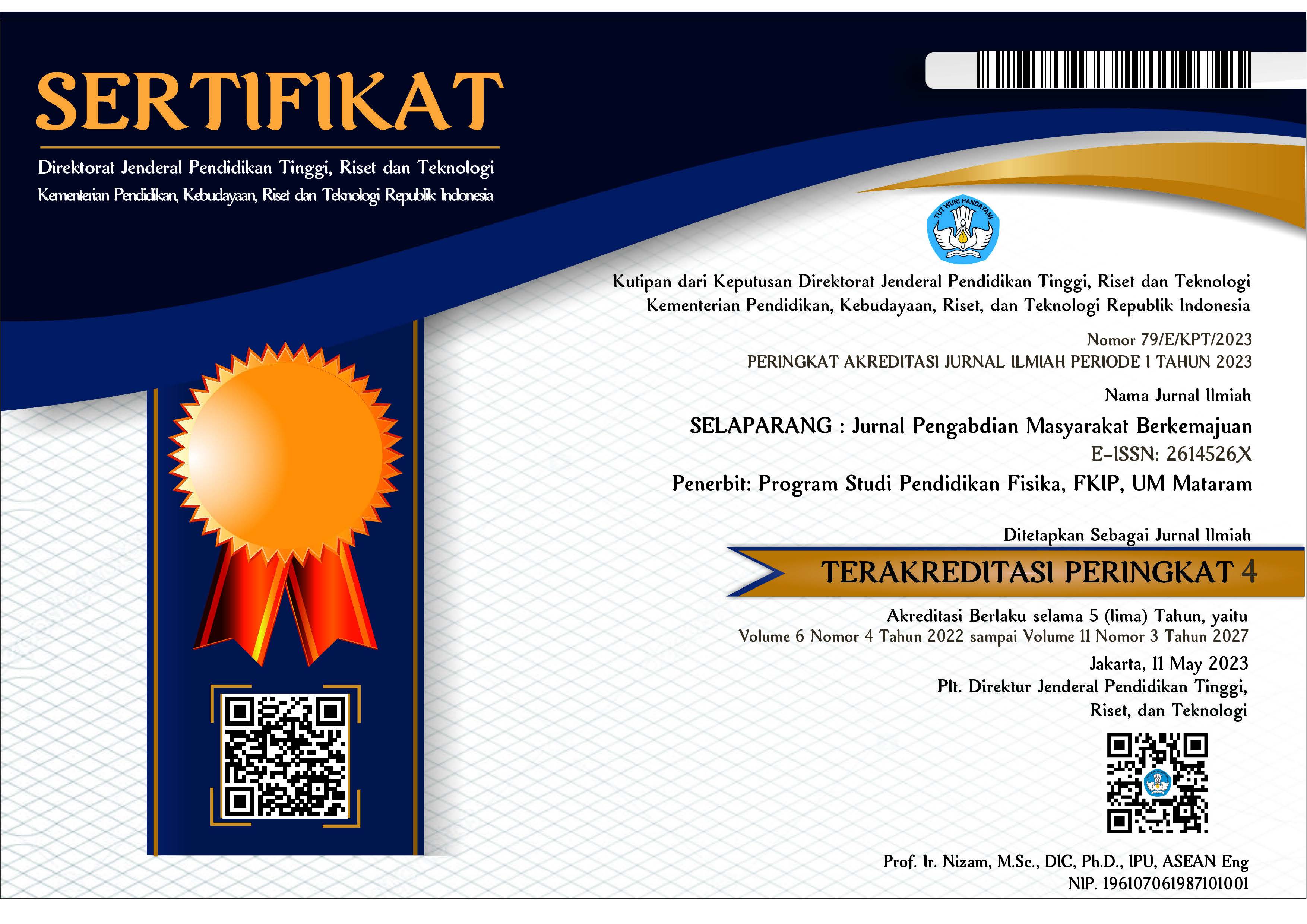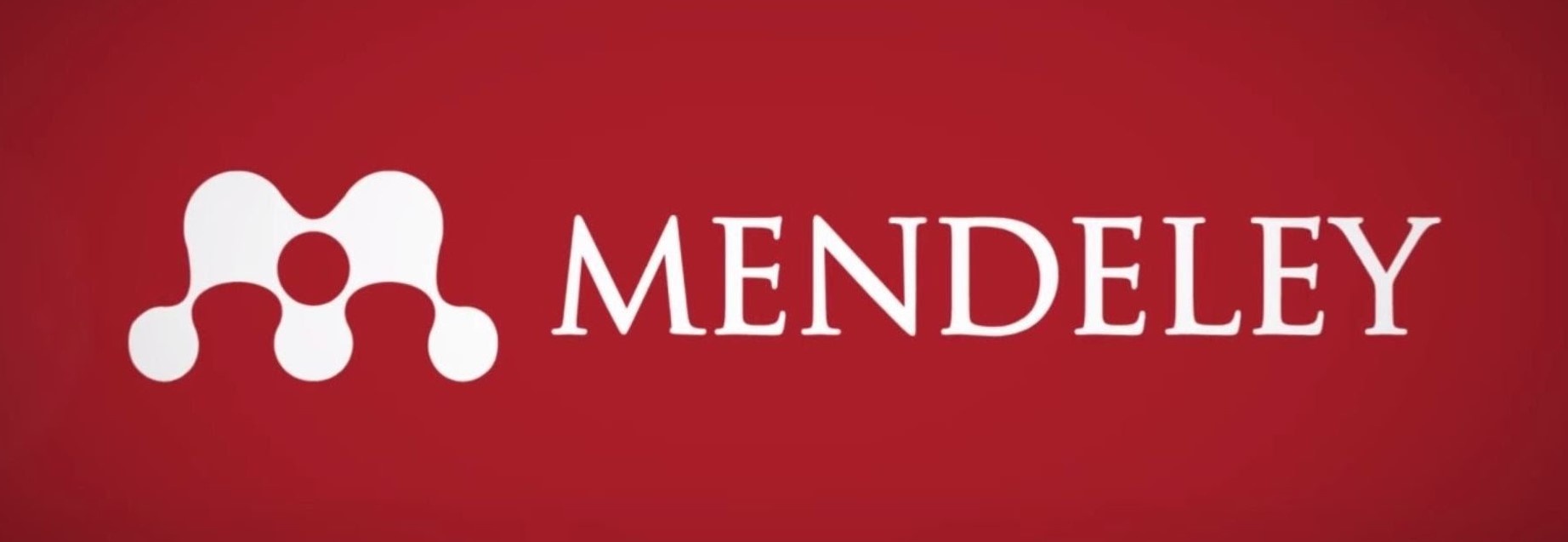Workshop line tracer robot training bagi siswa MTs Unggulan Darul Mujtaba
Abstract
Abstrak
Perkembangan teknologi dan informasi pada saat ini terus berkembang pesat. Salah satunya pada bidang robotika. MTs Unggulan Darul Mujtaba memiliki ektrakurikuler robotika, tetapi sudah berhenti dalam beberapa waktu karena kurangnya peralatan untuk ektrakuriler tersebut. Selain itu minimalisnya pendidik yang bisa memahami line tracer. Pelatihan ini diselenggarakan untuk memberikan pengetahuan dasar tentang robot Line Tracer dan mendemonstrasikan cara kerjanya. Pelatihan ini ditujukan pada para siswa MTs Unggulan Darul Mujtaba, kegiatan ini diselenggarakan satu hari saja (one-day activity). Metode pelaksanaan meliputi perencanaan, inti, dan evaluasi. Diharapkan dengan adanya pelatihan ini para siswa mendapat pdapatngan baru pada bidang robotika.
Kata Kunci: pelatihan; robotika; line tracer.
Abstract
The development of technology and information is currently growing rapidly. One of them is in the field of robotics. MTs Unggulan Darul Mujtaba has a robotics extracurricular, but it has stopped for some time due to the lack of equipment for the extracurricular. In addition, the minimalist educators who can understand line tracer. This training was held to provide basic knowledge about the Line Tracer robot and demonstrate how it works. This training is aimed at MTs Unggulan Darul Mujtaba students, this activity is held for one day only (one-day activity). Implementation methods include planning, core, and evaluation. It is hoped that with this training students will gain a new perspective on the field of robotics.
Keywords: training; robotics; line tracer.
Keywords
Full Text:
PDFReferences
Basso, M. and E. Pignaton De Freitas, (2020). “A UAV Guidance System Using Crop Row Detection and Line Follower Algorithms,” J. Intell. Robot. Syst., vol. 97, no. 3–4, pp. 605–621, doi: 10.1007/s10846-019-01006-0.
Bhuiya, Md. B. “Controlling Line Follower Robot with the Remote Web Server,” in Proceedings of SAI Intelligent Systems Conference (IntelliSys) 2016, vol. 16, Y. Bi, S. Kapoor, and R. Bhatia, Eds., in Lecture Notes in Networks and Systems, vol. 16. , Cham: Springer International Publishing, 2018, pp. 559–583. doi: 10.1007/978-3-319-56991-8_42.
Chang, K.-C., S. Ahmed, Z. Cheng, A. Ashraf, and F.-H. Chang, (2022). “Arduino Line Follower Using Fuzzy Logic Control,” in The 8th International Conference on Advanced Machine Learning and Technologies and Applications (AMLTA2022), vol. 113, Cham: Springer International Publishing, pp. 200–210. doi: 10.1007/978-3-031-03918-8_19.
Jannah, F. R., S. Fuada, H. E. Putri, F. W. Zanah, and W. Pratiwi, “Teaching analog Line-Follower (LF) robot concept through simulation for elementary students,” J. Phys. Conf. Ser., vol. 1987, no. 1, p. 012046, Jul. 2021, doi: 10.1088/1742-6596/1987/1/012046.
Kridoyono, A., M. Sidqon, A. B. Yunanda, I. Yuwono, and A. Sudaryanto, (2024). “Pengenalan Teknik Robotika untuk Anak Sekolah Dasar SDN Margorejo 1 Surabaya,” Kontribusi J. Penelit. Dan Pengabdi. Kpd. Masy., vol. 4, no. 2, pp. 339–355, doi: 10.53624/kontribusi.v4i2.410.
Ma’arif, A., A. A. Nuryono, and Iswanto, (2020). “Vision-Based Line Following Robot in Webots,” in 2020 FORTEI-International Conference on Electrical Engineering (FORTEI-ICEE), Bandung, Indonesia: IEEE, pp. 24–28. doi: 10.1109/FORTEI-ICEE50915.2020.9249943.
Oltean, S.-E., (2019). “Mobile Robot Platform with Arduino Uno and Raspberry Pi for Autonomous Navigation,” Procedia Manuf., vol. 32, pp. 572–577, doi: 10.1016/j.promfg.2019.02.254.
Oswal, S. and D. Saravanakumar, (2021). “Line following robots on factory floors: Significance and Simulation study using CoppeliaSim,” IOP Conf. Ser. Mater. Sci. Eng., vol. 1012, no. 1, p. 012008, doi: 10.1088/1757-899X/1012/1/012008.
Pérez, E. Serrano and F. Juárez López, “An ultra‐low cost line follower robot as educational tool for teaching programming and circuit’s foundations,” Comput. Appl. Eng. Educ., vol. 27, no. 2, pp. 288–302, Mar. 2019, doi: 10.1002/cae.22074.
Setiawan, N. C. E., S. Sutrisno, M. Munzil, and D. Danar, (2020). “Pengenalan STEM (Science, Technology, Engineering, and Mathematics) dan Pengembangan Rancangan Pembelajarannya untuk Merintis Pembelajaran Kimia dengan Sistem SKS di Kota Madiun,” Lumbung Inov. J. Pengabdi. Kpd. Masy., vol. 5, no. 2, p. 56, doi: 10.36312/linov.v5i2.465.
Sridhar, R., N. Pandey, A. Bhattacharyya, and V. Bhatia, (2016). “High Speed High Resolution Current Comparator and its Application to Analog to Digital Converter,” J. Inst. Eng. India Ser. B, vol. 97, no. 2, pp. 147–154, doi: 10.1007/s40031-015-0189-1.
Sridhar, R., S. Baskar, V. S. Shaisundaram, K. Karunakaran, M. Ruban, and S. Joseph Irudaya Raja, (2021). “Design and development of material behavior of line follower automated vehicle,” Mater. Today Proc., vol. 37, pp. 2193–2195, 2021, doi: 10.1016/j.matpr.2020.07.650.
Sulistyo, I. Aryan, B. Destyningtias, and T. Nurhayati, (2024). “Pengenalan dan Pelatihan Aplikasi Software Robot Bagi Siswa/Siswi SMKN 1 Tengaran Kab. Semarang: Introduction and Training on Robot Software Applications for Students of SMKN 1 Tengaran Kab. Semarang,” Nusant. J. Community Engagem. Empower., vol. 2, no. 1, pp. 22–27, doi: 10.36564/njcee.v2i1.26.
Thanh, V. N., D. P. Vinh, N. T. Nghi, L. H. Nam, and D. L. H. Toan, “Restaurant Serving Robot with Double Line Sensors Following Approach,” in 2019 IEEE International Conference on Mechatronics and Automation (ICMA), Tianjin, China: IEEE, Aug. 2019, pp. 235–239. doi: 10.1109/ICMA.2019.8816404.
Zaki, A. A., E. Mulyana, R. Mardiati, and Ulfiah, (2020). “Modeling Wall Tracer Robot Motion Based on Fuzzy Logic Control,” in 2020 6th International Conference on Wireless and Telematics (ICWT), Yogyakarta, Indonesia: IEEE, pp. 1–6. doi: 10.1109/ICWT50448.2020.9243624.
Zaman, H. U., Md. M. H. Bhuiyan, M. Ahmed, and S. M. T. Aziz, “A novel design of line following robot with multifarious function ability,” in 2016 International Conference on Microelectronics, Computing and Communications (MicroCom), Durgapur, India: IEEE, Jan. 2016, pp. 1–5. doi: 10.1109/MicroCom.2016.7522507.
DOI: https://doi.org/10.31764/jpmb.v8i3.25795
Refbacks
- There are currently no refbacks.

This work is licensed under a Creative Commons Attribution-ShareAlike 4.0 International License.
______________________________________________________
Jurnal Selaparang
p-ISSN 2614-5251 || e-ISSN 2614-526X
EDITORIAL OFFICE:



















